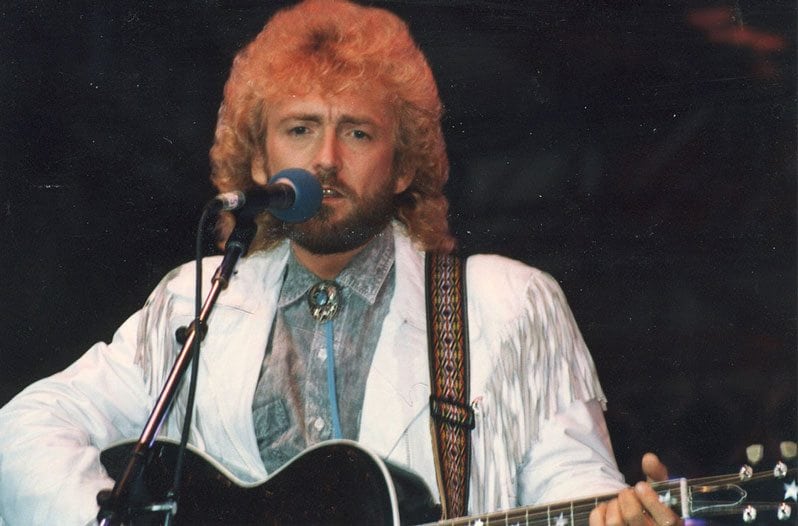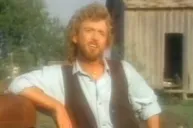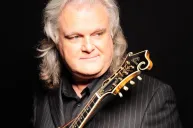On May 9, 1989, the world lost Keith Whitley. The prolific country singer died from alcohol poisoning at his Nashville home.
It's weird to think of an artist's career in terms of what could have been. Especially when you look at the career of an artist like Whitley, who achieved in his short 34 years what many spend a lifetime searching for and never find.
Whitley's first solo record, A Hard Act To Follow, was released in 1984, and by the time of his death five years later, he was well on his way to becoming one of country's biggest hit machines. He charted an astounding 19 songs on the US Country charts in his short time making music, including 12 during his lifetime and seven more after his death. He also charted five straight No. 1 singles.
Songs like "When You Say Nothing At All" and "Don't Close Your Eyes" have been slow-dance staples since their release, with the latter being named 1988's "No. 1 Country Song" by Billboard. Whitley's profound ability to tug at your heartstrings without sounding exploitative of your feelings made him one of country's most sincere artists.
And yet, it still feels like Whitley had so much more to accomplish. Who knows what he would've done in the next five years had his demons not gotten the better of him.
Though known for his contemporary country ballads, Whitley actually got his start in bluegrass. The Sandy Hook native met Ricky Skaggs when he was a teenager at a music contest in Kentucky, and the two immediately hit it off. They played shows together until one day, the story goes, Ralph Stanley happened upon the two entertaining his crowd after being late to a show.
Stanley was so impressed with Whitley and Skaggs, he asked them to be a part of his band, the Clinch Mountain Boys. They both joined and Whitley soon took over singing duties when he was still in his early 20s.
READ MORE: The 10 Best Randy Travis Songs
After nine years of making a name for himself in bluegrass, with additional stints in J.D. Crow and the New South, Whitley made the official plunge into country music by moving to Nashville and landing a contract with RCA Records. By the time he released his second studio album, L.A. To Miami, Whitley had earned the trust of his label and his peers. He was able to make the music he wanted to — even if it meant scrapping an entire collection of already completed songs to start over.
That's the kind of confidence you have — and the kind of confidence you're afforded — when you've been on the road making music since your teens. With Whitley at the helm of his own musical choices, he stayed steadfast in releasing introspective, emotional songs, even in a time when big 80s country production was all the rage.
Unfortunately, the country singer had also fallen deep into alcoholism.
Whitley picked up drinking at an early age. In fact, it had almost killed him several times before he gained any fame singing. Once, he was a passenger in a deadly car crash involving alcohol and reckless racing near his hometown. A second time, he was the driver when he took a plunge off a cliff and broke his collarbone.
As Whitley grew up and honed his craft, his drinking became much more private. He often preferred to be subtle about it, which sometimes hid just how severe it had gotten. Whitley also made several attempts to quit, particularly after the 1987 birth of his son Jesse Keith.
But his family and friends knew the severity of his disease. So much so, that his wife Lorrie Morgan would tie their legs together at night so she'd know if he tried to get up and get a drink. Whitley would drink nail polish and perfume to try and get drunk without her knowing.
On May 9, 1989, Whitley called his mom and saw his brother-in-law Lane Palmer. Palmer explained that they drank coffee and made plans to golf later that day, and that Whitley had planned to begin writing songs for an album featuring his wife. Palmer left Whitley at 8:30 a.m. He returned an hour later to find Whitley face down in bed, dead of alcohol poisoning. His blood alcohol level was .47, nearly five times the legal limit in Tennessee at the time.
Whitley had finished his fourth album right before his death. The album, I Wonder Do You Think Of Me, was released posthumously on Aug. 1 and climbed to No. 2 on the charts.
Keith Whitley left behind a huge hole in country music. He managed to blend sensitivity and honesty with a certain toughness and machismo that just came naturally. Whitley never really stooped to trends or tried to reaffirm his celebrity with silly ditties. Instead, he simply released music that spoke to him.
His music continues to speak to both country artists and fans, and Whitley has slowly seen a reemergence as country artists and writers reflect on the days before the huge stadium anthems and party tunes.
Artists like Garth Brooks and Alison Krauss have covered some of his greatest hits, turning them into successful new songs. A 1994 tribute album also featured renditions of his songs from Diamond Rio, Joe Diffie and Whitley's then-wife, Lorrie Morgan. Morgan and Whitley's son, Jesse Keith Whitley, also keeps his father legacy alive by performing covers of his songs, like the emotional "Tell Lorrie I Love Her."
Had he not left us too soon, there's no doubt Whitley would still be a force in the scene today with his classic sound in a vein similar to George Strait, Vince Gill or Alan Jackson. But that's not how the story goes, and instead we're left to ask what could have been.
Still, it's important to think back on Whitley not with sadness or empathy, but admiration and respect for his craft and artistry. His personal demons got the best of him, but he left behind a profound, albeit short, musical legacy to remember him by.
Keith Whitley hasn't yet been inducted into the Country Music Hall of Fame, but is among the backlog of artists fans want to see recognized.



